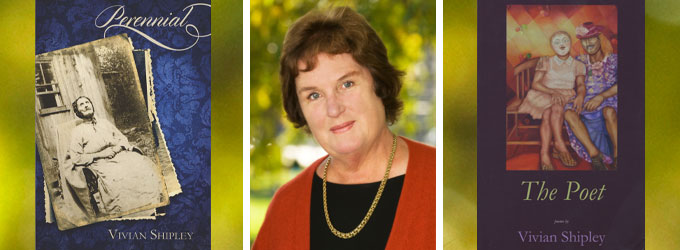English Professor Vivian Shipley, a Connecticut State University Distinguished Professor, has published two new volumes of poetry: Perennial (Negative Capability Press, 2015) and The Poet (Louisiana Literature Press, 2015). Shipley, who earned her bachelor of arts and master of arts degrees in English from the University of Kentucky and her doctorate in Victorian literature from Vanderbilt University, has taught at Southern since 1969 and has published 10 books of poetry and six chapbooks. She teaches undergraduate and graduate poetry writing workshops in the English Department.
The painting on the cover of The Poet is a portrait of Shipley’s mother- and father-in-law, Ruth and Morris Harris, who are dressed for a Halloween party. The artist, their daughter Marcia Harris, died from multiple sclerosis at age 49. Poems in this collection, says Shipley, are centered on the multiple disguises and masks that poets can wear and refer in one way or another to the act of writing poetry. “Fiction is, well, fiction,” Shipley says. “Poets seek to find truth, personal or universal, in their poetry. But, does poetry need to be literally true? Can and/or should the poet be a good liar? The difficulty of writing poetry that appears to be confessional but never really happened or didn’t happen quite that way can be very disturbing to other people—particularly family members.” In The Poet, Shipley explores different techniques to counter this problem and still write poems that sound as if the poet has had experiences she has not had. Readers who delve into the poems in The Poet can decide if Shipley really defaced Sylvia Plath’s gravestone, trekked the Inca Trail to get to Machu Picchu, hiked up Av. Du-Lachaise to visit Jim Morrison’s grave, was a surfer chick, a dominatrix or a hammer thrower. Personal poems about aging are, she admits, unfortunately true.
Shipley was raised in Kentucky, and her relatives all lived on dirt farms there. The photograph on the cover ofPerennial is of Celia Farmer, Shipley’s maternal great-great-grandmother, who lived to be 107 on one small farm or another in Pulaski County, Kentucky. Born in 1818, she died in 1925. Blind for many years, she had no teeth and was cared for at the end of her life by her daughter, Lydia Farmer Stewart, who was Shipley’s great-grandmother. Poems in Perennial, Shipley says, are centered on the persistent poverty, illness, and terror that plague the world generation after generation. The book’s first section, arranged in chronological order, begins with a poem about Rebecca Nurse, who in 1692 was hanged in Salem, Mass., for being a witch, and ends with a poem that pays tribute to the lives of 142 Christian students in Kenya who were killed by al-Shabab on April 2, 2015. Shipley says she does not believe her poems will impact constant acts of senseless brutality, but she thinks it’s important “to not look away or forget lives that have been snuffed out by mindless cruelty.” The book’s two other sections contain poems about personal loss, focusing largely on the deaths of Shipley’s parents. “A priest is blessed to be able to offer a communion wafer that provides salvation to a deeply troubled world,” Shipley says. “Poets have only their words to give. Evil in this world will not be tamed; widespread injustice will not be curbed. The poems in Perennial bear witness to the struggle of the heart, the mind, the body ensnared by powers that cannot be understood or controlled.”
A New York Times review of Shipley’s poetry says that it “preserves a uniqueness of place,” and her work has received many accolades. Her book All of Your Messages Have Been Erased (Louisiana Literature Press, 2010) was nominated for the Pulitzer Prize and won both the 2011 Paterson Award for Sustained Literary Achievement and the Sheila Motton Book Prize for Poetry from New England Poetry Club. It was also recognized as Best Creative Work by the Connecticut Press Club and was a finalist for both the Connecticut Book Prize and the Milton Kessler Poetry Prize from SUNY-Binghamton. Shipley has received many other awards and recognitions as well, including being chosen as SCSU Faculty Scholar three times and named to the University of Kentucky Hall of Distinguished Alumni.


